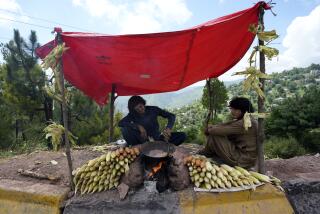Latest Indonesia, IMF Pact Allows Some Subsidies
- Share via
WASHINGTON — The latest agreement between the International Monetary Fund and Indonesia, announced Wednesday, should be enough to rescue the economy of the world’s fourth-most-populous country without imposing undue hardship on the Indonesian people, according to Clinton administration officials.
“We believe that this program has key ingredients that are necessary for Indonesia’s economic recovery,” a senior Treasury Department official said. “What will be necessary is for Indonesia to carry out the steps called for in the economic program.”
The agreement is the third in six months between the IMF and the Indonesian government on the details of a $43-billion rescue package.
The two earlier deals fell through because President Suharto’s government was unwilling to meet the IMF’s demand for economic belt-tightening.
This time, the plan calls for the IMF to dole out the money in very small increments while making sure the Indonesian government keeps its part of the bargain.
Unlike the two earlier efforts, the latest pact allows Indonesia to continue subsidies for basic foods and fuel, steps intended to ease the impact of the government’s austerity plan on the public, already reeling from runaway inflation, soaring unemployment and a 70% plunge in the value of the currency--the rupiah--since summer.
Subsidies are an anathema to the IMF because they distort a country’s economy. Consumers often waste goods that have subsidized prices, using bread, for instance, to feed animals because it is cheaper than fodder. And subsidy deals often set prices so low that farmers are unwilling to sell their crops.
However, IMF officials concluded that an immediate end to subsidies in Indonesia would produce a dangerous level of unrest.
In exchange for allowing continuation of some subsidies, the IMF got Suharto’s pledge to institute tough monetary policies and step up the pace of privatization of industry in his country.
IMF officials, who had withheld a $3-billion payment in March because of Suharto’s failure to implement reforms, made it clear they would continue to monitor Indonesia’s compliance with the package and would disperse future installments accordingly.
Governments throughout Southeast Asia greeted the announcement of the deal in Jakarta with relief. Indonesia’s economic woes--the most severe in the region--have spilled across borders, hindering Asia’s recovery as a whole, and raised fears that social unrest--directed against the government or Indonesia’s prosperous community of ethnic Chinese--could create a new wave of “boat people” fleeing to neighboring countries.
IMF and Indonesian officials originally put together the 50-point bailout package last October, just after the Asia economic crisis struck Indonesia.
Before then, the country had enjoyed years of impressive growth and been praised by international investors as a model of wise national management. But overlooked was that Suharto and his children had become a royal family, building up a fortune estimated at $40 billion. The banking system had largely come under the control of Suharto, his family and friends.
Suharto showed he was willing to sacrifice some of his family’s wealth and yield on some IMF demands last weekend when he said Indonesia had frozen the operation of seven insolvent banks with links to his family.
*
Kempster reported from Washington, Lamb from Hanoi.
More to Read
Sign up for Essential California
The most important California stories and recommendations in your inbox every morning.
You may occasionally receive promotional content from the Los Angeles Times.













